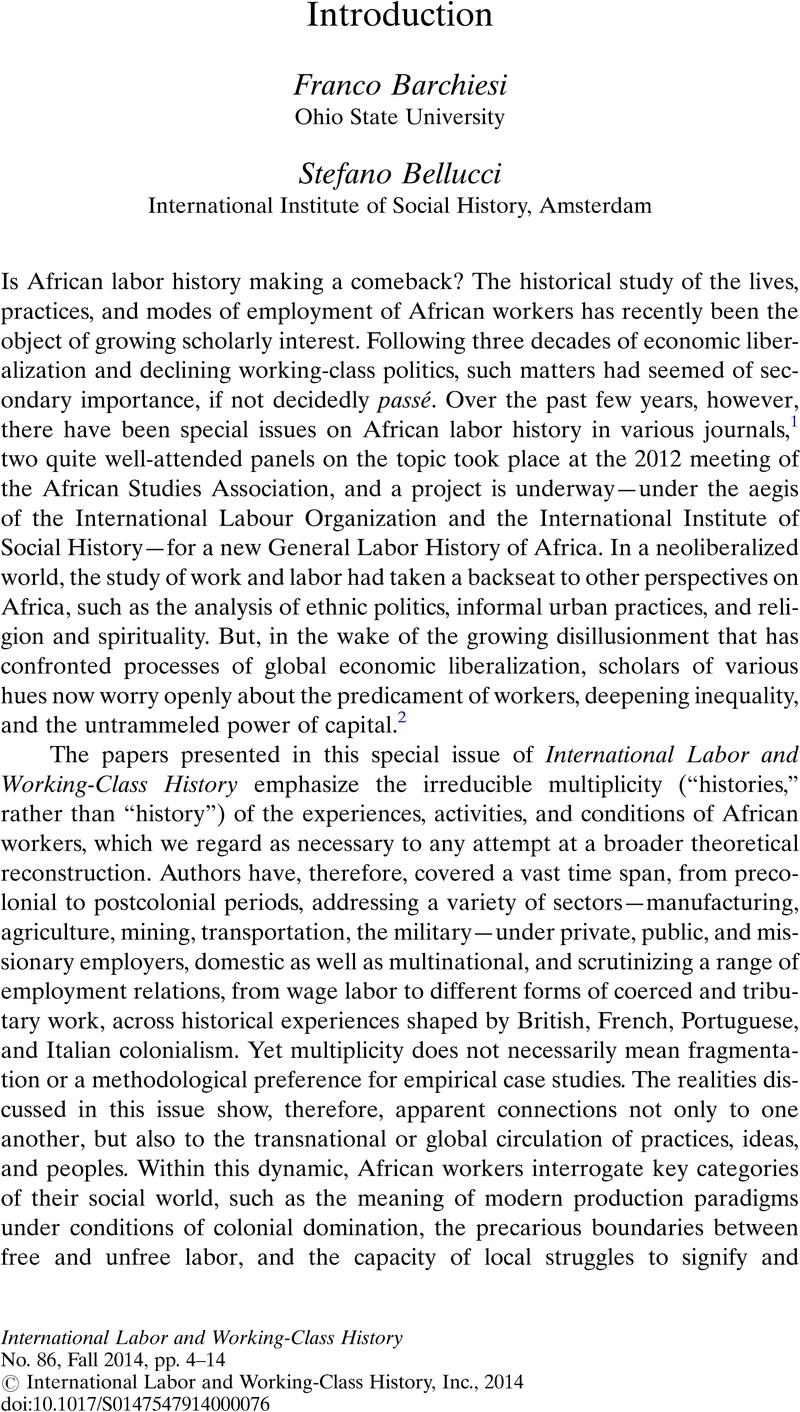Article contents
Introduction
Published online by Cambridge University Press: 18 November 2014
Abstract

- Type
- African Labor Histories
- Information
- Copyright
- Copyright © International Labor and Working-Class History, Inc. 2014
References
NOTES
1. An important example is Schler, Lynn, Betlehem, Louise, and Sabar, Galia, eds., “Rethinking Labor in Africa: Past and Present,” African Identities 7, 3 (2009)CrossRefGoogle Scholar.
2. The history of labor and the history of capitalism are, of course, inextricably linked, as emphasized, for example, in Neal, Larry and Williamson, Jeffrey, eds., The Cambridge History of Capitalism, 2 vols. (Cambridge, 2014)Google Scholar, to which several African and labor historians have contributed. On the importance of linking labor history to the study of capitalism in Africa, see also Austin, Gareth, Labour, Land and Capital in Ghana: From Slavery to Free Labour in Asante, 1807–1956 (Rochester, NY, 2008)Google Scholar.
3. Examples of this early scholarship are Cohen, Robin, Gutkind, Peter, and Copans, Jean, eds., African Labor History (Beverly Hills, CA, 1978)Google Scholar; Sandbrook, Richard and Cohen, Robin, eds., The Development of an African Working Class: Studies in Class Formation and Action (Toronto, 1975)Google Scholar.
4. Robin Cohen, Peter Gutkind, and Jean Copans, “Introduction,” in African Labor History, 16.
5. For an overview of African labor studies in the postindependence period, see Freund, Bill, The African Worker (Cambridge, 1988)Google Scholar.
6. See van Holdt, Karl, “Social Movement Unionism: The Case of South Africa,” Work, Employment and Society 16 (2002): 283–304 CrossRefGoogle Scholar; and Dibben, Pauline, “Trade Union Change, Development and Renewal in Emerging Economies: The Case of Mozambique,” Work, Employment and Society 24 (2010): 468–86CrossRefGoogle Scholar.
7. Examples of this literature, including its optimistic orientation, are Harcourt, Mark and Wood, Geoffrey, eds., Trade Unions and Democracy: Strategies and Perspectives (Manchester, UK, 2004)Google Scholar and Kraus, Jon, ed., Trade Unions and the Coming of Democracy in Africa (New York, 2007)CrossRefGoogle Scholar.
8. Cooper, Frederick, Decolonization and African Society: The Labor Question in French and British Africa (Cambridge, 1996)CrossRefGoogle Scholar. It is indicative of the status of African labor history at the time that Cooper's book was published in the same year as Mamdani, Mahmood's Citizen and Subject: Contemporary Africa and the Legacy of Late Colonialism (Princeton, NJ, 1996)Google Scholar. Mamdani stressed the importance within decolonization of the “native question”—the rule of African populations through ethnically and culturally inflected notions of difference—as opposed to the “labor question,” the focus of Cooper's study. It is telling that Mamdani's book went on to win the 1997 Herskovits Book Prize of the African Studies Association.
9. Cooper, Decolonization and African Society, 14.
10. See also Leys, Colin, Underdevelopment in Kenya. The Political Economy of Neo-Colonialism, 1964–1971 (London, 1975)Google Scholar.
11. See Lindell, Ilda, eds., Africa's Informal Workers: Collective Agency, Alliances, and Transnational Organizing in Urban Africa (London, 2010)Google Scholar.
12. See Barchiesi, Franco, Precarious Liberation: Workers, the State, and Contested Social Citizenship in Postapartheid South Africa (Albany, NY, 2011)Google Scholar.
13. An important case study is Lubeck, Paul, “Islamic Protest Under Semi-Industrial Capitalism: ‘Yan-Tatsine Explained,” Africa 55 (1985): 369–89CrossRefGoogle Scholar.
14. See van der Linden, Marcel, “The Promise and Challenges of Global Labor History,” International Labor and Working-Class History 82 (2012): 57–76 CrossRefGoogle Scholar; and Barchiesi, Franco, “How Far from Africa's Shores? A Response to Marcel van der Linden's Map for Global Labor History,” International Labor and Working-Class History 82 (2012): 77–84 CrossRefGoogle Scholar.
15. On methodological nationalism and its critiques, see De Vito, Christian G., “New Perspectives on Global Labour History: Introduction,” Workers of the World: International Journal on Strikes and Social Conflicts 1, 3 (2012): 7–31 Google Scholar, especially 8–14.
16. See Roth, Karl Heinz and van der Linden, Marcel, Beyond Marx: Theorising the Global Labour Relations of the Twenty-First Century (Leiden, 2013), 21Google Scholar.
17. Useful discussions of this point are in Ferguson, James, Global Shadows: Africa in the Neoliberal World Order (Durham, NC, 2006)CrossRefGoogle Scholar.
- 2
- Cited by


